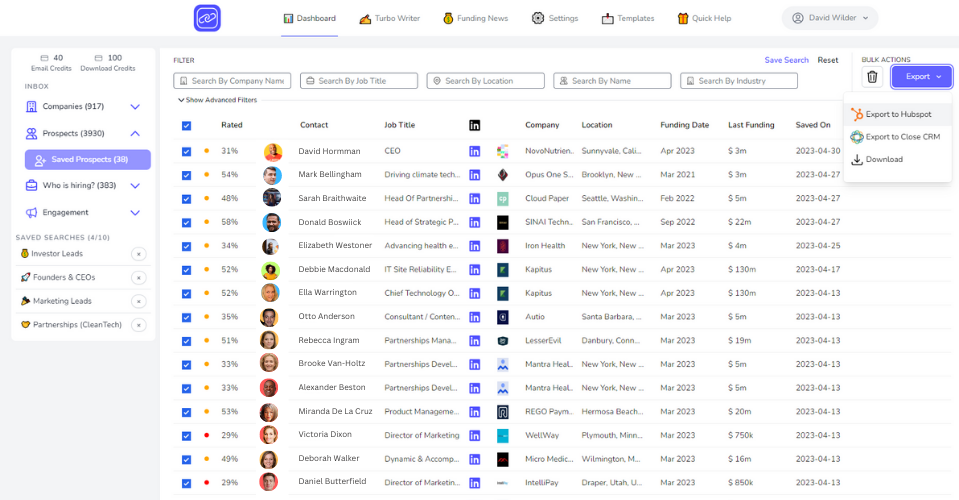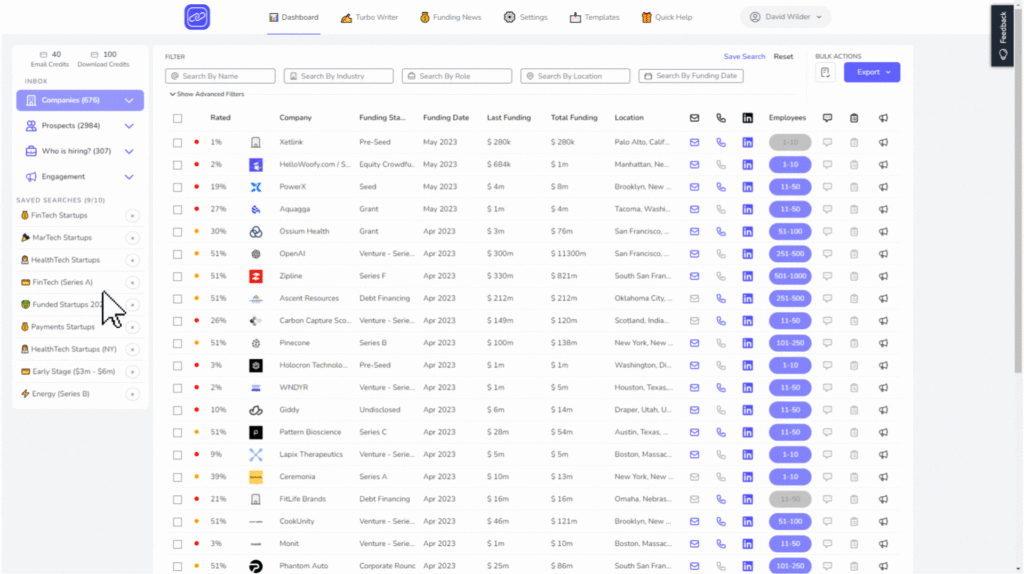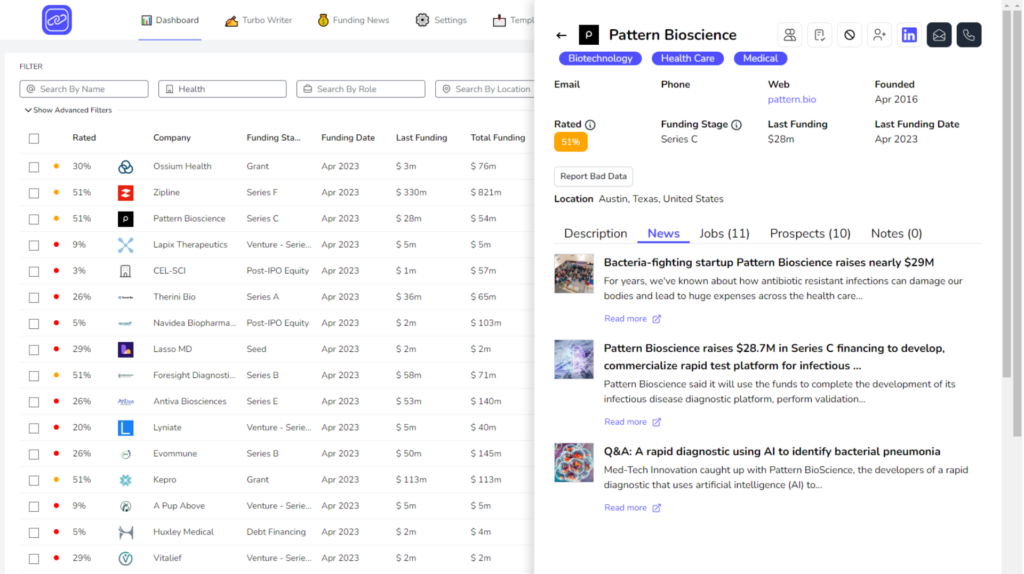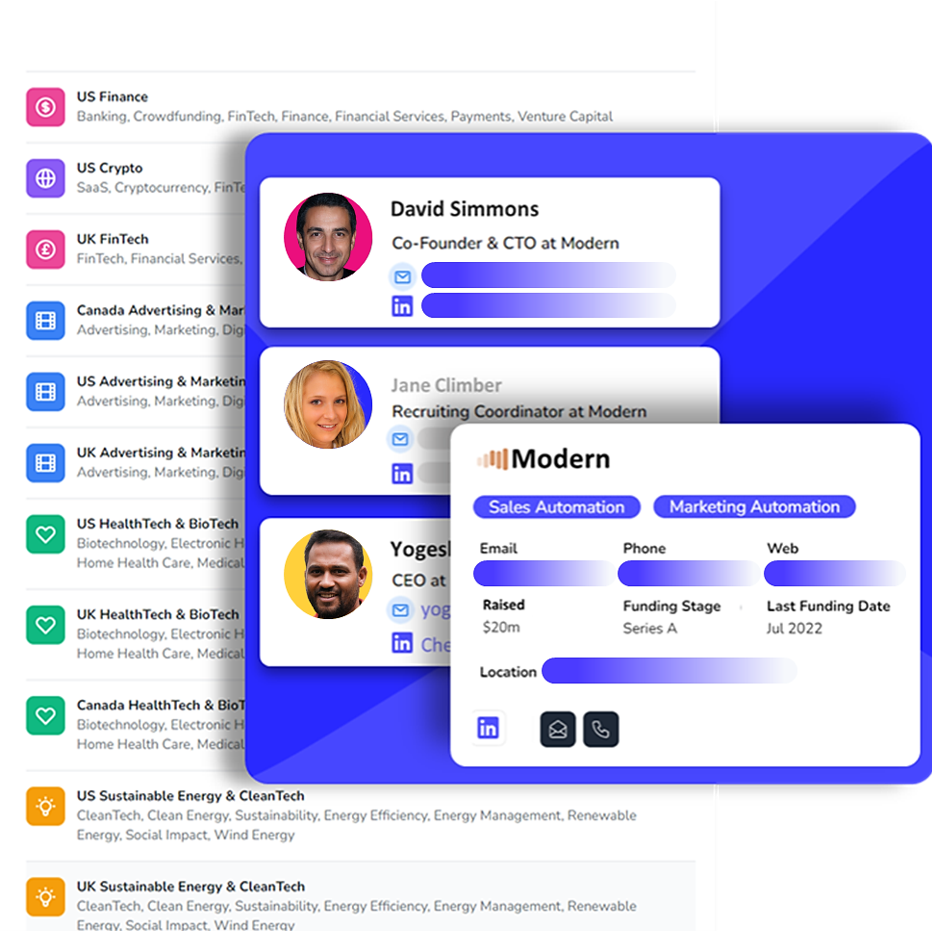In this blog, we will be comparing ZoomInfo and Prelo to determine which prospecting tool is better for targeting Startups. We’ll examine their key features, advantages, and drawbacks.
By the end, you’ll have the insights needed to decide which prospecting tool is the perfect match for your startup-focused outreach endeavors.
In the fast-paced realm of business development and sales, prospecting tools have become absolute game-changers.
They empower us to identify leads, nurture connections, and fuel our growth. Among the top contenders in this arena are ZoomInfo and Prelo.
These sales outreach tools provide robust features and invaluable insights for businesses aiming to target Startups with precision.
Let’s get straight into it!

Understanding ZoomInfo : The Prospecting Tool for Enterprise Teams
ZoomInfo is a powerful prospecting tool that offers valuable insights about prospects and customers.
With its comprehensive database of over 200 million business contacts worldwide, ZoomInfo enables businesses to research market trends, uncover sales opportunities, and foster stronger customer relationships.
Let’s jump into its key features and assess the pros and cons of using ZoomInfo.
ZoomInfo’s Key Features
ZoomInfo’s strength lies in its comprehensive database, advanced prospecting tools, intuitive interface, and integrated analytics and reporting capabilities. Its key features include:
- Comprehensive Database: ZoomInfo provides detailed information on business contacts worldwide, offering valuable data points such as contact details, company information, and more. This extensive database facilitates accurate targeting and efficient lead generation.
- Advanced Prospecting Tools: ZoomInfo’s suite of advanced prospecting tools empowers users to uncover leads, identify influencers, and build relationships. Its features include an advanced search engine, detailed contact profiles, user-friendly lists and segments, and an automated lead scoring system.
- Intuitive Interface: ZoomInfo is a prospecting tool that boasts an intuitive interface that simplifies navigation and streamlines the search process. Users can quickly find relevant people, companies, and topics, enhancing productivity and effectiveness.
- Analytics & Reporting: ZoomInfo offers integrated analytics and reporting features, allowing users to track their prospecting efforts, measure success, and identify areas for improvement. This includes lead scoring reports, contact and company analytics, performance metrics, and an intuitive dashboard for easy access to key insights.
Pros of Using ZoomInfo
ZoomInfo offers several advantages as a prospecting tool for growing businesses targeting high-growth Startups:
- Access to Comprehensive Database: With over 200 million business contacts worldwide, ZoomInfo provides a vast pool of data, allowing businesses to target the right contacts quickly and accurately.
- Efficient Lead Generation: ZoomInfo’s advanced prospecting tools enable users to uncover leads, identify influencers, and build relationships more efficiently. The automated lead scoring system helps prioritize leads and focus outreach efforts effectively.
- User-Friendly Interface: ZoomInfo’s intuitive interface makes it easy to navigate and utilize its functionalities. Users can quickly find the information they need, saving time and effort in the prospecting process.
- Enhanced Reporting and Analytics: ZoomInfo’s integrated analytics and reporting features help users track their progress, measure success, and make data-driven decisions. The comprehensive suite of reporting tools provides valuable insights into lead generation, conversion rates, and contacts reached.
Cons of Using ZoomInfo
While a prospecting tool like ZoomInfo offers significant benefits, it’s important to consider the following potential drawbacks:
- Limited Support: Some users have reported limited customer support from ZoomInfo, particularly when it comes to resolving technical issues or addressing complex inquiries. Troubleshooting errors with the search engine has been a common challenge that customers have faced.
- Cost Considerations: ZoomInfo’s pricing can be expensive, particularly for small businesses and organizations with limited budgets. The monthly license fee for a small team of 5 people can be upwards of $2,500, making it a significant investment for some businesses.
- Data Quality Issues: Most prospecting tools suffer from this and ZoomInfo is no exception. Although ZoomInfo aims to provide comprehensive and accurate data, there have been reports of data quality issues. It is essential to verify the accuracy of information and conduct due diligence in ensuring the completeness and currency of the data.
- Security Concerns: In the past, there have been concerns about ZoomInfo’s security. While the company has implemented measures to enhance security, users should stay informed about the latest updates and take necessary precautions to protect their data.
Exploring Prelo : The Prospecting Tool For Targeting Startups
Prelo is a promising prospecting tool designed specifically for Startups. It offers a range of features to help businesses target startups effectively, but how does it compare to ZoomInfo? Let’s delve into Prelo’s key features and evaluate its pros and cons.

Key Features of Prelo
Prelo distinguishes itself with features tailored for startup-focused client outreach (Prospecting). Its key features include:
- Startup Database: Prelo provides a comprehensive database of startup companies, enabling businesses to focus their outreach efforts on this specific market segment. The database includes essential information such as company details, industry, funding stage, and more.
- Integration Capabilities: Prelo integrates with popular CRM systems, such as HubSpot, Close CRM, and ChatGPT. This seamless integration streamlines data management and enhances workflow efficiency.
- Email Validation: Prelo offers email validation services, ensuring the accuracy and quality of contact information. While there may be some delays in receiving email validation results, Prelo is actively working on improving this process.
- Global Search Limitation: The individual plan of Prelo currently allows for up to two high-level scope filters. This limitation means that only two startup data population feeds can run simultaneously. However, Prelo is exploring the expansion of this limitation to four filters to accommodate larger-scale operations.
Pros for Using Prelo
Prelo offers several advantages for businesses targeting startups:
- Startup-Focused Database: Prelo’s specialized startup database provides businesses with targeted and relevant information, facilitating more effective outreach and engagement with Startups.
- Seamless Integration: Prelo integrates with popular CRM systems, allowing businesses to streamline their data management and leverage existing workflows.
- Email Validation Services: Prelo’s email validation feature ensures the accuracy and quality of contact information, contributing to higher deliverability rates and more effective communication.
- Targeted Scope Filters: While the current limitation allows for two high-level scope filters, Prelo’s expansion plans to accommodate up to four filters will offer businesses greater flexibility in running multiple startup data population feeds simultaneously.
Cons of Using Prelo:
It’s important to consider the following potential drawbacks when using Prelo vs other prospecting tools like ZoomInfo:
- Limited Integration: Prelo currently offers integration with HubSpot, Close CRM, and ChatGPT. While the company has plans to expand its list of integrations to include Salesforce, Pipedrive, Zoho, and Apollo, the current integration options may be limiting for businesses using other CRM systems.
- Email Validation Delays: While Prelo provides email validation services, some users have reported delays in receiving validation results. This may require users to exercise patience and plan their outreach accordingly.
Head to Head Comparison : Prelo vs ZoomInfo
Database Coverage
When comparing ZoomInfo and Prelo, it’s important to assess the coverage and depth of their databases. ZoomInfo is a prospecting tool that boasts a huge database of over 200 million business contacts worldwide and provides a vast pool of information for targeting prospects. On the other hand, Prelo focuses specifically on Startups, offering a specialized startup database with detailed information on companies, industry, funding stage, and more.
While ZoomInfo provides a broader coverage of contacts across various industries and company sizes, Prelo’s startup-focused approach can be advantageous for businesses specifically targeting Startups.
Prospecting Tools and Automation
Both ZoomInfo and Prelo offer advanced prospecting tools and automation features to streamline lead generation and relationship building. ZoomInfo’s advanced search engine, detailed contact profiles, user-friendly lists and segments, and automated lead scoring system provide powerful tools for prospecting.
Similarly, Prelo offers specialized features such as targeted scope filters, startup database search capabilities, and email validation services tailored to startup-focused prospecting. These tools empower businesses to efficiently identify leads, target Startups, and optimize their outreach efforts.
User-Friendliness and Interface
ZoomInfo’s intuitive interface and responsive design make it user-friendly across different devices and screen sizes. The interface adapts to various platforms, ensuring a seamless experience for users.
Prelo also prioritizes user-friendliness with a clean and straightforward interface. Its search capabilities and integration features are designed to enhance usability and improve productivity. Both tools offer intuitive interfaces, but personal preferences and specific requirements may influence which interface is more suitable for your team.
Integration and CRM Compatibility:
ZoomInfo integrates with popular CRM systems, including Salesforce, HubSpot, and Marketo, allowing for seamless data synchronization and workflow optimization. This integration capability ensures that prospecting data can be easily managed within existing CRM systems.
Prelo currently integrates with HubSpot, Close CRM, and ChatGPT. While the company has plans to expand its list of integrations to include Salesforce, Pipedrive, Zoho, and Apollo, businesses using other CRM systems may face limitations with the current integration options. It is essential to evaluate your CRM compatibility needs when choosing between the two tools.
Pricing and Affordability:
One significant consideration for businesses is the pricing and affordability of prospecting tools. ZoomInfo’s pricing structure can be expensive for small businesses and organizations with limited budgets. The monthly license fee for a small team of 5 people can exceed $2,500, making it a substantial investment.
On the other hand, Prelo offers pricing plans tailored to startup needs, with more affordable options. It provides flexibility based on the number of users and startup data population feeds required. This affordability factor makes Prelo an attractive option for startups or businesses on a tight budget.
Data Quality and Security:
Data quality and security are critical considerations when selecting a prospecting tool. ZoomInfo aims to provide comprehensive and accurate data, but there have been reports of data quality issues. Businesses using ZoomInfo as a prospecting tool should conduct due diligence in verifying the accuracy and completeness of the data.
ZoomInfo has taken steps to enhance security, including the implementation of two-factor authentication, end-to-end encryption, and other measures. However, concerns have been raised in the past, highlighting the importance of staying informed about the latest security updates.
Prelo also prioritizes data quality, aiming to provide accurate and reliable information. While data accuracy may still be subject to verification, Prelo offers email validation services to ensure the quality and deliverability of contact information.
Choosing the Right Prospecting Tool for Targeting Startups
Choosing the right prospecting tool for targeting Startups depends on your specific needs, budget, and preferences. Consider the following factors:

Prelo Dashboard – Showing The Latest Funded Startups
- Target Market: If your primary focus is targeting Startups, Prelo’s specialized startup database may provide more relevant and targeted information. However, if you require a broader coverage across different industries and company sizes, ZoomInfo’s extensive database may be more suitable.
- Integration Needs: Assess your CRM integration requirements. If your business already uses CRM systems such as Salesforce or HubSpot, ZoomInfo’s existing integrations may offer a seamless workflow. On the other hand, if you require integration with specific CRM systems like Close CRM or ChatGPT, Prelo’s integration options may be a better fit.
- Budget Constraints: Consider your budget and affordability. If you have a limited budget or are a startup yourself, Prelo’s pricing plans designed for startups may offer a more cost-effective solution. However, if budget is not a significant concern, ZoomInfo’s comprehensive features and extensive database may be worth the investment.
- User Interface and Usability: Evaluate the user-friendliness and interface of both tools. Take into account your team’s preferences and ease of use when navigating and utilizing the features offered by each tool.
- Data Quality and Security: Consider the importance of data accuracy and security. While both tools aim to provide reliable data, consider any past reports of data quality issues or security concerns and weigh them against the measures taken by each tool to address these issues.
Conclusion
In the world of prospecting tools, both ZoomInfo and Prelo offer powerful features and insights to help businesses target Startups effectively. ZoomInfo’s extensive database, advanced prospecting tools, and integration capabilities make it a popular choice for businesses seeking comprehensive coverage and broader industry targeting.
On the other hand, Prelo’s specialized startup database, affordability, and tailored features cater specifically to startup-focused prospecting needs. Its email validation services and ongoing development efforts make it an attractive option for businesses with a tighter budget or those seeking a more targeted approach.
Ultimately, the choice between ZoomInfo and Prelo depends on your specific requirements, budget, and preferences. Evaluate each tool’s key features, pros, and cons in light of your startup targeting objectives to make an informed decision that aligns with your business goals. Remember to consider factors such as database coverage, prospecting tools, user-friendliness, integration compatibility, pricing, data quality, and security.

Tired of pitching to Startups with zero budget?
Try Prelo
💡Access to over one million qualified leads from well-funded Startups
😲Discover Emails and Business Contacts of decision makers in seconds
🎯Send targeted emails to well-funded Startups and 10x your revenue




